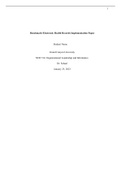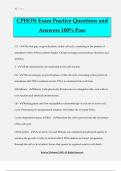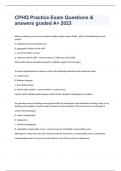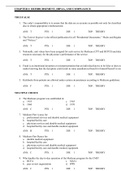Consumer research in marketing
Inductive: developing theory: from specific observations to broad
generalizations.
Deductive: testing existing theory: from broad generalizations to specific
observations.
Week 1
Videos:
Research fundamentals
What is research?
Gathering information to solve a particular problem.
a studious inquiry or examination: especially an investigation or
experimentation aimed at the discovery and interpretation of facts, the revision
of accepted theories or laws in the light of new facts, or the practical application
of such new or revised theories or laws.
Systematic process of collecting information to solve some kind of
problem and update knowledge that has be proven wrong.
Uncover the objective truth, the objective nature of reality.
Why do we conduct research?
To solve problems, answer research questions and advance knowledge, to
uncover the truth.
A continuous process, updated over time
How can we conduct research?
- We can use existing theories to derive hypotheses and test them
- We can create new theories based on observation and inquiry
3 steps:
Ask a question: a question that can be answered by conducting a research study.
How to come up with a question?
- Observe the world around us and derive it based on these observations
- Conduct prior research, build on them
- Use professional literature
- Ask your peers
Theory: a statement of concepts and their interrelationships that shows how and
of why a phenomenon occurs.
Generate hypotheses: a proposition or prediction about a phenomenon of the
world.
Collect data
Experiment: a form of research in which one or more factors are manipulated to
see their effect on an outcome. People are randomly assigned to one of the
groups.
Ethnography: a form of naturalistic inquire (observation, participation, interviews
etc) that has a specific interest in culture.
,Analyze the data
Research paradigms:
Research approaches.
What is a research paradigm?
A lens or way of thinking about the world. It proves direction for the researched,
different ways of thinking about reality.
2 types (continuum):
- Positivist paradigm
- Interpretivist paradigm
Seeing the world in different ways.
What characterizes different research paradigms?
What are the basic assumptions, beliefs, norms, and values.
1. Ontology: what is the nature of reality? What is real?
2. Epistemology: how can we know reality?
3. Axiology: what is valuable and ethical? Where do values come from?
4. Methodology: how is research conducted?
Ontology
Beliefs about the nature of reality. Influences our perception of truth, what we
think we can know about reality, characterized by what is? Questions.
- Positivist: realism. Objective.
- one objective reality or truth
- independent of context
- human behavior is determined
-> climate change: man made, objective truth.
-> gravity: objective evidence that it is real. No form of interpretation.
- Interpretivist: relativism. Subjective.
- multiple subjective realities or truths
- reality is socially constructed and perceived and evolves with context
- human behavior is created rather than determined
-> culture: allows for subjective interpretations. Depends from where ou
look at it.
-> art: how we evaluate and interpreted art is determined who looks at
the art and in which context, very subjective.
Epistemology
The study of knowledge, determine how we can know reality (a researcher’s
approach to knowledge generation) dictated by ontological beliefs. How do we
generate knowledge? One objective or multiple subjective realities?
- Positivist:
- one objective measurement
- regularities and laws
- through looking at real causes and effects.
- through specific rules for doing science (e.g. falsifiability)
Etic approach: from the outside. Looking from the outside, measuring,
observing etc.
- Interpretivist:
- subjective perception
- more emphasis on meaning, motives, or experiences
, - it’s mostly about mutual simultaneous shaping of cause and effect. Not
one specific cause but an interplay
Emic approach: from the inside. Participating and interacting and co-
creating.
Axiology
The study of value: deals with the nature of what is valuable and ethical, what
you value or aim for in your research. Determines the goals of your research
- Positivist:
- research should be value free, objective
- guided by logic
- goal: explanation and prediction
- Interpretivist:
- values help co-construct meaning
- research should be guided by intuition
- goal: understanding
Methodology
General research strategy: outlines how the research is conducted and
identified the methods used. How knowledge is discovered and analyzed in a
systematic way.
- Positivist:
- deductive research: look at theories, come up with hypotheses, deduce it
from prior knowledge and research, and then test it to see whether the
hypotheses can be confirmed or rejected.
- systematic way
- testing theories and hypotheses
- mostly quantitative
-> e.g. experiments
- Interpretivist
- inductive: induce from experience, co-created meaning, collecting data,
they create theories and come up with hypothesis based on experience
rather than prior knowledge.
- emergent: not systematic, methodology might change throughout the
process
- generating theories and hypotheses
- mostly qualitative
-> ethnography
Methodology is not method. Methodology is the research approach/strategy.
Method is the research tool or data-gathering technique.
- Methodology: how the data is gathered and analyzed
- data gathering techniques/methods
- research design
- research setting
- subjects
- analysis
- reporting
- Method: a particular technique
- experiments
- interviews
- questionnaires
- etc.
, How do research paradigms dictate research?
They determine:
- What we define as truth
- How we can obtain this truth
- What values guide our truth
- General research strategy
What is consumer research?
The study of people operating in a consumer role involving acquisition,
consumption, and disposition of marketplace products, services, and
experiences.
Seven premises (Hollbrook 1987):
- Consumer research studies consumer behavior
- Consumer behavior entails consumption
- Consumption = acquisition, usage, and disposal of products
- Products = goods, services, events, ideas, etc. that provide value
- Value = when a goal is achieved or fulfilled
- Such achievement leads to consummation
- Consumer research = the study of consummation.
Mainly influenced by 3 disciplines:
- Behavioral economics: e.g. perceptual biases, framing effects, judgement
and decision making.
- Social & cognitive psychology: e.g. attitudes, information processing,
perception, self-identity, personality)
- Sociology & anthropology: e.g. consumer culture theory
Why do we need consumer research?
None of the other disciplines focus on all consumption stages.
- Macroeconomics: aggregate spending behavior
- Microeconomics: individuals’ allocation of resources based on marginal
utility theory
- Psychology: human behavior, includes consumption behavior
- Sociology: social consumption contexts
- Anthropology: consumption rituals. Meanings of consumption across
cultures
- Philosophy: morality and ethics
- Humanistics: consumption of culture
Other fields neglect the unique circumstanced faced in marketing:
Studies unique stimuli: ads, commercial videos etc.
Studies unique phenomena: gifting, act of consuming/buying etc.
Studies unique behavioral outcomes: WOM, willingness to pay/ purchase etc.
Studies unique market-force-shaped behaviors: recycling, donation,
crowdfunding etc.
What is the goal of contemporary consumer research?
Gaining meaningful, practical insights, used by stakeholders such as consumers,
researchers, policy makers, marketers etc.
Quantitative vs. qualitative methods
Inductive: developing theory: from specific observations to broad
generalizations.
Deductive: testing existing theory: from broad generalizations to specific
observations.
Week 1
Videos:
Research fundamentals
What is research?
Gathering information to solve a particular problem.
a studious inquiry or examination: especially an investigation or
experimentation aimed at the discovery and interpretation of facts, the revision
of accepted theories or laws in the light of new facts, or the practical application
of such new or revised theories or laws.
Systematic process of collecting information to solve some kind of
problem and update knowledge that has be proven wrong.
Uncover the objective truth, the objective nature of reality.
Why do we conduct research?
To solve problems, answer research questions and advance knowledge, to
uncover the truth.
A continuous process, updated over time
How can we conduct research?
- We can use existing theories to derive hypotheses and test them
- We can create new theories based on observation and inquiry
3 steps:
Ask a question: a question that can be answered by conducting a research study.
How to come up with a question?
- Observe the world around us and derive it based on these observations
- Conduct prior research, build on them
- Use professional literature
- Ask your peers
Theory: a statement of concepts and their interrelationships that shows how and
of why a phenomenon occurs.
Generate hypotheses: a proposition or prediction about a phenomenon of the
world.
Collect data
Experiment: a form of research in which one or more factors are manipulated to
see their effect on an outcome. People are randomly assigned to one of the
groups.
Ethnography: a form of naturalistic inquire (observation, participation, interviews
etc) that has a specific interest in culture.
,Analyze the data
Research paradigms:
Research approaches.
What is a research paradigm?
A lens or way of thinking about the world. It proves direction for the researched,
different ways of thinking about reality.
2 types (continuum):
- Positivist paradigm
- Interpretivist paradigm
Seeing the world in different ways.
What characterizes different research paradigms?
What are the basic assumptions, beliefs, norms, and values.
1. Ontology: what is the nature of reality? What is real?
2. Epistemology: how can we know reality?
3. Axiology: what is valuable and ethical? Where do values come from?
4. Methodology: how is research conducted?
Ontology
Beliefs about the nature of reality. Influences our perception of truth, what we
think we can know about reality, characterized by what is? Questions.
- Positivist: realism. Objective.
- one objective reality or truth
- independent of context
- human behavior is determined
-> climate change: man made, objective truth.
-> gravity: objective evidence that it is real. No form of interpretation.
- Interpretivist: relativism. Subjective.
- multiple subjective realities or truths
- reality is socially constructed and perceived and evolves with context
- human behavior is created rather than determined
-> culture: allows for subjective interpretations. Depends from where ou
look at it.
-> art: how we evaluate and interpreted art is determined who looks at
the art and in which context, very subjective.
Epistemology
The study of knowledge, determine how we can know reality (a researcher’s
approach to knowledge generation) dictated by ontological beliefs. How do we
generate knowledge? One objective or multiple subjective realities?
- Positivist:
- one objective measurement
- regularities and laws
- through looking at real causes and effects.
- through specific rules for doing science (e.g. falsifiability)
Etic approach: from the outside. Looking from the outside, measuring,
observing etc.
- Interpretivist:
- subjective perception
- more emphasis on meaning, motives, or experiences
, - it’s mostly about mutual simultaneous shaping of cause and effect. Not
one specific cause but an interplay
Emic approach: from the inside. Participating and interacting and co-
creating.
Axiology
The study of value: deals with the nature of what is valuable and ethical, what
you value or aim for in your research. Determines the goals of your research
- Positivist:
- research should be value free, objective
- guided by logic
- goal: explanation and prediction
- Interpretivist:
- values help co-construct meaning
- research should be guided by intuition
- goal: understanding
Methodology
General research strategy: outlines how the research is conducted and
identified the methods used. How knowledge is discovered and analyzed in a
systematic way.
- Positivist:
- deductive research: look at theories, come up with hypotheses, deduce it
from prior knowledge and research, and then test it to see whether the
hypotheses can be confirmed or rejected.
- systematic way
- testing theories and hypotheses
- mostly quantitative
-> e.g. experiments
- Interpretivist
- inductive: induce from experience, co-created meaning, collecting data,
they create theories and come up with hypothesis based on experience
rather than prior knowledge.
- emergent: not systematic, methodology might change throughout the
process
- generating theories and hypotheses
- mostly qualitative
-> ethnography
Methodology is not method. Methodology is the research approach/strategy.
Method is the research tool or data-gathering technique.
- Methodology: how the data is gathered and analyzed
- data gathering techniques/methods
- research design
- research setting
- subjects
- analysis
- reporting
- Method: a particular technique
- experiments
- interviews
- questionnaires
- etc.
, How do research paradigms dictate research?
They determine:
- What we define as truth
- How we can obtain this truth
- What values guide our truth
- General research strategy
What is consumer research?
The study of people operating in a consumer role involving acquisition,
consumption, and disposition of marketplace products, services, and
experiences.
Seven premises (Hollbrook 1987):
- Consumer research studies consumer behavior
- Consumer behavior entails consumption
- Consumption = acquisition, usage, and disposal of products
- Products = goods, services, events, ideas, etc. that provide value
- Value = when a goal is achieved or fulfilled
- Such achievement leads to consummation
- Consumer research = the study of consummation.
Mainly influenced by 3 disciplines:
- Behavioral economics: e.g. perceptual biases, framing effects, judgement
and decision making.
- Social & cognitive psychology: e.g. attitudes, information processing,
perception, self-identity, personality)
- Sociology & anthropology: e.g. consumer culture theory
Why do we need consumer research?
None of the other disciplines focus on all consumption stages.
- Macroeconomics: aggregate spending behavior
- Microeconomics: individuals’ allocation of resources based on marginal
utility theory
- Psychology: human behavior, includes consumption behavior
- Sociology: social consumption contexts
- Anthropology: consumption rituals. Meanings of consumption across
cultures
- Philosophy: morality and ethics
- Humanistics: consumption of culture
Other fields neglect the unique circumstanced faced in marketing:
Studies unique stimuli: ads, commercial videos etc.
Studies unique phenomena: gifting, act of consuming/buying etc.
Studies unique behavioral outcomes: WOM, willingness to pay/ purchase etc.
Studies unique market-force-shaped behaviors: recycling, donation,
crowdfunding etc.
What is the goal of contemporary consumer research?
Gaining meaningful, practical insights, used by stakeholders such as consumers,
researchers, policy makers, marketers etc.
Quantitative vs. qualitative methods







